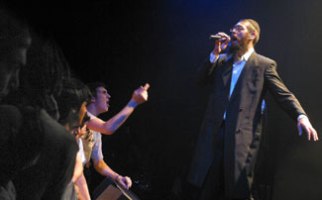In With the Nu
Permanent link All Posts

Matisyahu performs at a Jerusalem club in December 2005. (photo: Brian Hendler/JTA)
The face of American Jewry is changing, thanks in large part to the efforts of this country’s younger members of the tribe, who are finding new ways of expressing their Judaism that don’t always line up with the traditional values of existing Jewish institutions.
Many of today’s young Jews have replaced “congregations” with “communities,” prefer Matisyahu concerts to federation dinners and do not allow Judaism alone to limit or define them. This reinvention of Jewish life has prompted an upsurge in Jewish media on the Internet via magazines, blogs and online communities.
Out with the old…?
“New ideas seem to explode onto the scene in different places at roughly the same time,” says Tahl Raz, president and editor of Jewcy Media. “There is a yearning among young people. Young Jews are interested in figuring out whether this thing means anything to them.”
He says traditional Jewish media (publications produced by Jewish denominations, local communities or federations) is dying and—if he’s right that traditional outlets are producing “irrelevant content in an irrelevant medium”—maybe it should be.
Jewcy, an online ideas-and-culture magazine, launched in November of 2006 and quickly became the most visited Jewish media site in the country. The media group recently received a round of financing to launch its second online version set to roll out in the next few months, which will include more regionally-focused content as well as greater social networking capabilities and event listings.
Online publications and communities like Jewcy have to represent the values of this generation, Raz says. There are still Jews out there who want Jewish media, he says, and smart new leaders are taking over.
Chicago’s NuJews
The idea that Judaism can be expressed as well at a bar as at a temple is more widespread and successful in coastal Jewish communities like New York and L.A., but a few local NuJew pioneers have had success in bringing this movement to the Midwest.
In Chicago, these efforts are largely being spearheaded by Adam Davis, a self-proclaimed Jewish social entrepreneur, who runs the KFAR Jewish Arts Center and authors two blogs, Jewishfringe and 312Jews.
“I’m not sure that it’s a reinvention so much as a reclamation,” Davis says. “The under 40 set generally views the world somewhat differently than their parents. We grew up on MTV, download the exact songs we want to hear, are overwhelmed with marketing messages and media in general. Content is king, community is often virtual and top down messages are viewed with skepticism unless received virally through the social networks that have supplanted institutions.
“Apply that to Jewish life and it could seem like a complete breakdown of communal structures. It’s more of a paradigm shift, and a healthy one. Young Jews are seeking authentic Jewish voices of our generation that resonate with us. And when we’ve found them lacking, we haven’t waited for institutions to develop the answers they weren’t likely to provide—we’ve created them.”
“(This new expression of Judaism) is very user-driven, peer-connected, bottom-up and allows for creativity. That combination seems to threaten some, but it really needs to be supported, nurtured and funded, lest we alienate young Jews at a crucial point in the battle against—not assimilation and intermarriage—but apathy.”
In 2002, Davis coordinated his first KFAR Center event, bringing in Israeli musicians and artists and hosting them at Chicago venues like The Cubby Bear, Crush and Beat Kitchen. He also organizes discussion groups and events through Facebook and his blogs.
“These opportunities are not just ways to bridge into our own community,” he said, “they’re ways to bridge out.” And there are a certain percentage of people, he said, that find their way back to the Jewish community through his efforts.
A nu way to pray
Religious types are also rethinking Judaism. Rabbi Menachem Cohen, who founded the Mitziut Jewish Community in East Rogers Park in 2003, has succeeded in doing Judaism his way—and, as it turns out, his way is really appealing to a lot of people. Mitziut, which comes from the Hebrew word for "reality," is an independent, non-denominational Jewish spiritual community. People from the neighborhood, people of all Jewish backgrounds, and some from non-Jewish backgrounds, come from all over the Chicago area to participate in a welcoming, participatory community.
Throughout the country, more than eighty new emerging spiritual communities like this one have recently come on the scene, and while they vary in terms of mission, culture and nomenclature, they all agree that they will not be labeled as synagogues or congregations.
Cohen does not like to compare Mitziut to a traditional synagogue. A typical Friday night Shabbat service involves 25 to 30 participants sitting in a circle singing, chanting and dancing. The community also offers a meditation drop-in group and a Jewish drum circle which uses drumming as prayer.
“My goal is to find out what does all this mean to us in our day-to-day life, on a mystical and practical level,” Rabbi Cohen said. “I feel that my calling is to be there for people on their spiritual journeys.”
At Oy!, we’re committed to the conversation. Comment below and tell us how you’re living your Jewish, or Jew-ish, life.



.jpg)



